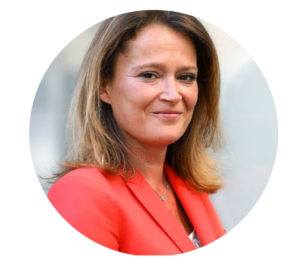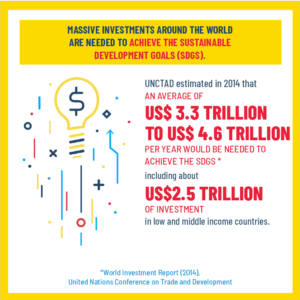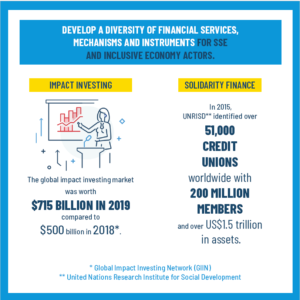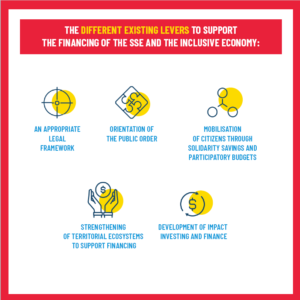
Financing the OESS
Thematic Guide #1: Financing of the Social and Solidarity Economy (SSE)
Which financing challenges are facing the organisations from the Social Solidarity Economy (SSE) ?
Achieving the sustainable development goals (SDGs) of the 2030 Agenda is only possible through the mobilization and orientation of financial resources towards initiatives and projects with a positive impact on the planet. This summary provides an overview of the challenges of accessing and adapting the financing offer to SSE organizations in the context of achieving the SDGs. It will enrich and support the work carried out by the members of the PACT FOR IMPACT Alliance to produce 100 concrete commitments for a more inclusive, fair, green and innovative economy.
EDITORIALS
« The development and success of the Social Solidarity Economy and the Inclusive Economy requires the quality and sustainability of its financing. »
Olivia GREGOIRE, French Secretary of State in charge of the Social, Solidarity and Responsible Economy

« Social and solidarity finance has always been about creating a positive impact beyond financial returns by intentionally deploying capital to deliver solutions to societal imperatives. […]. We must continue to work together so that the values which characterise [this] social finance become models to follow. »
Milder VILLEGAS, Director General of Filaction and President of INAISE

« The future of finance lies in impact, and this is a promising prospect for SSE actors. In the impact approach, change is not only a positive externality but constitutes the core of the investment. In this, impact finance has strong affinities with SSE, which will represent an attractive investment thesis and will therefore be able to benefit from a new influx of capital. »
Xavier PLOQUIN, Senior Associate, Chief of staff of the CEO of Meridiam

Necessary funding for the development of the SSE
Which tools are available to the public sector?
In order to support the achievement of the sustainable development goals (SDGs) of the 2030 Agenda, it is necessary to free up, facilitate and direct more funding towards the Social Solidarity Economy (SSE).
Economic and financial support to SSE organisations is a powerful lever for the transformation of our societies and economies. To this end, states, local and regional governments, and other public institutions can use different measures to open up, facilitate and steer more funding towards SSE and the Inclusive Economy and thus contribute to the achievement of the Sustainable Development Goals (SDGs) set by the UN.
- The implementation of a legal framework adapted to SSEs;
- The orientation of public ordering towards solidarity and responsible purchasing;
- The support to the development of the solidarity finance and impact investment sector;
- The development of the financial culture among SSEs and citizens.




